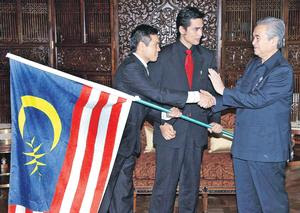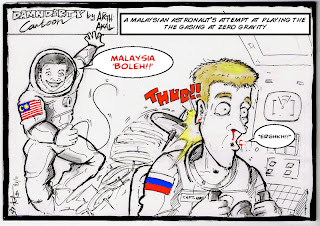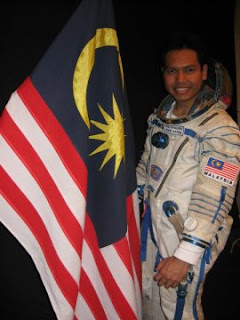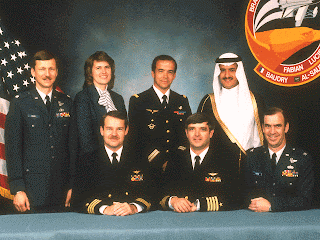 The Americans have their astronauts. The Russians call theirs cosmonauts. The Chinese join the space
The Americans have their astronauts. The Russians call theirs cosmonauts. The Chinese join the space  team with taikonauts. And although sadly under-represented, our dear neighbour Malaysia is about to send her first angkasawan (Malay for astronaut) to space this coming October.
team with taikonauts. And although sadly under-represented, our dear neighbour Malaysia is about to send her first angkasawan (Malay for astronaut) to space this coming October. In what is known as the Angkasawan Program, Malaysia's National Space Agency (yes bet nobody knew it actually does exist) is set to send her first Malaysian into space. It is a joint programme with Russia where it agrees to train two Malaysian astronauts and later send one to the International Space Station.
In what is known as the Angkasawan Program, Malaysia's National Space Agency (yes bet nobody knew it actually does exist) is set to send her first Malaysian into space. It is a joint programme with Russia where it agrees to train two Malaysian astronauts and later send one to the International Space Station. THE CHOSEN ANGKASA-ONE
The Chosen Angkasa-One is believed to be Dr Sheikh Muszaphar Shukor (above left) and Captain Dr Faiz Bin Khaleed, who is to be his back-up. It is recently revealed though that this is still subject to change. Regardless, as of yesterday, both were recognised as Malaysia's angkasawan negara, or official astronauts of the state. 
SINGAPORE HATES MALAYSIA, AND VICE VERSA
We here in Singapore has be fed with negative portrayal of Malaysia for far too long that certain achievements made by our nearest neighbour is often never discussed, or at worst, discredited. I'm sure Malaysia has also done the same to Singapore in past years, and although our recent leaders stressed the importance of cooperation, it seem a mutual undeniable  dislike which defines our cross-Causeway ties.
dislike which defines our cross-Causeway ties.
Singaporeans have never gave a shit about Malaysia's aspirations, nor gave a sniff when the Petronas Twin Towers were the tallest buildings in the world, prior to Taiwan's Tapipei 101. I know their police force is brutally corrupt and their government officials seem incompetent, but most draw their conclusions from trips to crime-infested Johor while there are among the most skeptic of us who actually love KL and remarked that it is "almost like Singapore". However i feel that there are some things that we have to see beyond our prejudice and judge on an enlightened mind.
THE UNENLIGHTENED ONES
I am also disappointed to also learn that skeptics were also found in Malaysia itself with regard to this space program. Apparently there were some high criticisms over the entire thing, despite the fact that it is such a prestigious endeavour. The main criticism is that the cost of sending a single Malaysian into space has been estimated to be around RM $95 million, and that the country could use such a spending to better domestic usage.
In what was to be part of the program to emphasise on the 'Malay-ness' and of Malaysian heritage, there were plans to pour the teh-tarik, batik-drawing, spin a traditional gasing (top) and flip roti canai (roti prata) in space. It definitely drew the headlines, bringing this seemingly everyday things and experiment it at zero-gravity, but unfortunately the plan backfired and it was widely ridiculed by various Malaysians themselves.
.
 These cartoons i found from a Malaysian's blog. I mean with all this critics, truly i find it incredibly sad to think that their very own citizens do not seem to want to share in living the 'Malaysian dream'. I mean so be it if the first Malaysian to space is brought together with Russians on a Russian aircraft. But does it not ought to matter the various means one takes to achieve a great feat? Why must one be so skeptic where grand aspirations are involved. I read with great respect the blogs of the said astronauts (found in the official website), they truly sound like you and me, living their long-awaited childhood dreams, sharing their rare experiences. Does it not kill the excitement of these future heroes to see caricatures like those above, belittling their effort in bringing national glory?
These cartoons i found from a Malaysian's blog. I mean with all this critics, truly i find it incredibly sad to think that their very own citizens do not seem to want to share in living the 'Malaysian dream'. I mean so be it if the first Malaysian to space is brought together with Russians on a Russian aircraft. But does it not ought to matter the various means one takes to achieve a great feat? Why must one be so skeptic where grand aspirations are involved. I read with great respect the blogs of the said astronauts (found in the official website), they truly sound like you and me, living their long-awaited childhood dreams, sharing their rare experiences. Does it not kill the excitement of these future heroes to see caricatures like those above, belittling their effort in bringing national glory? SCIENTIFIC PROGRAM OF THE MALAYSIAN ASTRONAUT
1. Cells in Space (CIS_
Study of the effects of microgravity and space radiation on eukaryotic cells focusing on changes in the structure and function at the cellular and molecular levels
2. Microbes in Space (MIS)
Study of the effects of microgravity on motility of bacteria, drug resistances as well as changes in gene expression (using the microarray approach). Expect to show some effects of bacterial growth using a pre-determined minimum inhibitory concentration (MIC).
3. Protein Crystallisation in Space (PCS)
The purpose of this experiment is to compare the crystal growth of lipases on Earth with that grown in microgravity. Several test conditions will also be tested to improve the protein crystallisation process on Earth as well as in space.
4. Malaysian Food in Space (FIS)
Increase the variety and quality of food available to Malaysian cosmonaut by identifying new food items (typical Malaysian food).
5. Study of spinning motions in microgravity environment (TOP)
A physics demonstration to show the effect of microgravity on the motions of spinning object using a top.
6. PR and Symbolics (PAS)
PR and Symbolics activities.

MUSLIMS IN SPACE
 The first Muslim to space was Sultan bin Salman bin Abdulaziz Al Saud, a Saudi Arabian prince who was also the first Arab and first royalty to space in 1985 (see picture above). If that feat was done with the cooperation of the United States, i see no reason why people should question Malaysia doing the same with Russia.
The first Muslim to space was Sultan bin Salman bin Abdulaziz Al Saud, a Saudi Arabian prince who was also the first Arab and first royalty to space in 1985 (see picture above). If that feat was done with the cooperation of the United States, i see no reason why people should question Malaysia doing the same with Russia. 
 One of the Malaysian government's objective for sending a man to space is also to "awe and inspire" in lieu of her 50th year of independence from colonial rule this year. It truly illustrates such a long way the nation has come, and truly despite all the criticisms, sending a citizen to space is defnitely something that any nation can be proud of. In light of the askewed view the West has on Islam, Malaysian authorities also sought to bring back the glory days of the Islamic Golden Age where science and technology prevailed. "It is important to note that the Malaysian sent to space is also a Muslim". The significance of this at this age is to prove that while viewed as backward, Islam sets store for advancements, contrary to what the West might perceive.
One of the Malaysian government's objective for sending a man to space is also to "awe and inspire" in lieu of her 50th year of independence from colonial rule this year. It truly illustrates such a long way the nation has come, and truly despite all the criticisms, sending a citizen to space is defnitely something that any nation can be proud of. In light of the askewed view the West has on Islam, Malaysian authorities also sought to bring back the glory days of the Islamic Golden Age where science and technology prevailed. "It is important to note that the Malaysian sent to space is also a Muslim". The significance of this at this age is to prove that while viewed as backward, Islam sets store for advancements, contrary to what the West might perceive. For me on the ground level, despite all the skepticism, i think Malaysians themselves can't help but feel proud of the space program when they witness the live telecast of the launch to space. I think it does not hurt as well that they are sending a dashing bachelor and intellect like Sheikh Muszhaphar, a handsome hero who has the brains and brawns. I'm not surprise too if he would become the object of desire for every Malay woman to have as their husband. Perhaps not too far-fetched, they would stand alongside classic heroes like Hang Tuah and Jebat of the modern age today. Now they dare say Malays are backward? I beg to differ, sir.
For me on the ground level, despite all the skepticism, i think Malaysians themselves can't help but feel proud of the space program when they witness the live telecast of the launch to space. I think it does not hurt as well that they are sending a dashing bachelor and intellect like Sheikh Muszhaphar, a handsome hero who has the brains and brawns. I'm not surprise too if he would become the object of desire for every Malay woman to have as their husband. Perhaps not too far-fetched, they would stand alongside classic heroes like Hang Tuah and Jebat of the modern age today. Now they dare say Malays are backward? I beg to differ, sir. 


 The next day i went Geylang again with my family. I still maintain
The next day i went Geylang again with my family. I still maintain 
 I'd wanted to buy pink baju kurung this year, yeah no kidding. Cos i bought for my mom this gorgeous pink
I'd wanted to buy pink baju kurung this year, yeah no kidding. Cos i bought for my mom this gorgeous pink 































